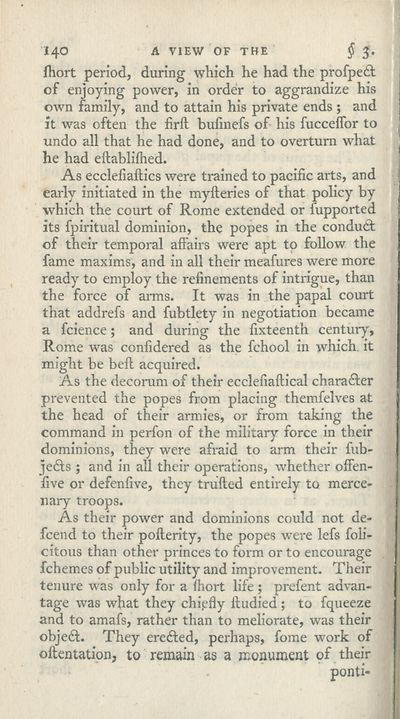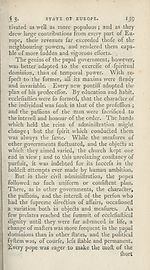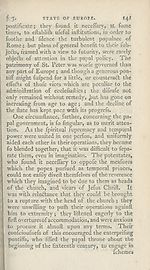Download files
Complete book:
Individual page:
Thumbnail gallery: Grid view | List view

140 A VIEW OF THE $
fhort period, during which he had the profpetl
of enjoying power, in order to aggrandize his
own family, and to attain his private ends ; and
it was often the firft bufinefs of his fuccelfor to
undo all that he had done, and to overturn what
he had eftablilhed.
As ecclefiaftics were trained to pacific arts, and
early initiated in the myfteries of that policy by
which the court of Rome extended or fupported
its fpiritual dominion, the popes in the conduct
of their temporal affairs were apt to follow the
fame maxims, and in all their meafures were more
ready to employ the refinements of intrigue, than
the force of arms. It was in the papal court
that addrefs and fubtlety in negotiation became
a fcience; and during the fixteenth century,
Rome was confidered as the fchool in which it
might be beft acquired.
As the decorum of their ecclefiaftical chara&er
prevented the popes from placing themfelves at
the head of their armies, or from taking the
command in perfon of the military force in their
dominions, they were afraid to arm their fub-
jefts ; and in all their operations, whether offen-
five or defenfive, they trufted entirely to merce¬
nary troops.
As their power and dominions could not de-
fcend to their pofterity, the popes were lefs feli¬
citous than other princes to form or to encourage
fchemes of public utility and improvement. Their
tenure was only for a ffiort life ; prefent advan¬
tage was what they chiefly ftudied ; to fqueeze
and to amafs, rather than to meliorate, was their
object. They erefted, perhaps, fome work of
oftentation, to remain as a monument of their
fhort period, during which he had the profpetl
of enjoying power, in order to aggrandize his
own family, and to attain his private ends ; and
it was often the firft bufinefs of his fuccelfor to
undo all that he had done, and to overturn what
he had eftablilhed.
As ecclefiaftics were trained to pacific arts, and
early initiated in the myfteries of that policy by
which the court of Rome extended or fupported
its fpiritual dominion, the popes in the conduct
of their temporal affairs were apt to follow the
fame maxims, and in all their meafures were more
ready to employ the refinements of intrigue, than
the force of arms. It was in the papal court
that addrefs and fubtlety in negotiation became
a fcience; and during the fixteenth century,
Rome was confidered as the fchool in which it
might be beft acquired.
As the decorum of their ecclefiaftical chara&er
prevented the popes from placing themfelves at
the head of their armies, or from taking the
command in perfon of the military force in their
dominions, they were afraid to arm their fub-
jefts ; and in all their operations, whether offen-
five or defenfive, they trufted entirely to merce¬
nary troops.
As their power and dominions could not de-
fcend to their pofterity, the popes were lefs feli¬
citous than other princes to form or to encourage
fchemes of public utility and improvement. Their
tenure was only for a ffiort life ; prefent advan¬
tage was what they chiefly ftudied ; to fqueeze
and to amafs, rather than to meliorate, was their
object. They erefted, perhaps, fome work of
oftentation, to remain as a monument of their
Set display mode to:
![]() Universal Viewer |
Universal Viewer | ![]() Mirador |
Large image | Transcription
Mirador |
Large image | Transcription
| Antiquarian books of Scotland > Kings & rulers > History of the reign of the Emperor Charles V. > Volume 1 > (158) |
|---|
| Permanent URL | https://digital.nls.uk/109184227 |
|---|
| Description | By William Robertson. London : Cadell and Davies, 1798. |
|---|---|
| Shelfmark | ABS.1.76.13 |
| Additional NLS resources: | |
| Description | Thousands of printed books from the Antiquarian Books of Scotland collection which dates from 1641 to the 1980s. The collection consists of 14,800 books which were published in Scotland or have a Scottish connection, e.g. through the author, printer or owner. Subjects covered include sport, education, diseases, adventure, occupations, Jacobites, politics and religion. Among the 29 languages represented are English, Gaelic, Italian, French, Russian and Swedish. |
|---|

